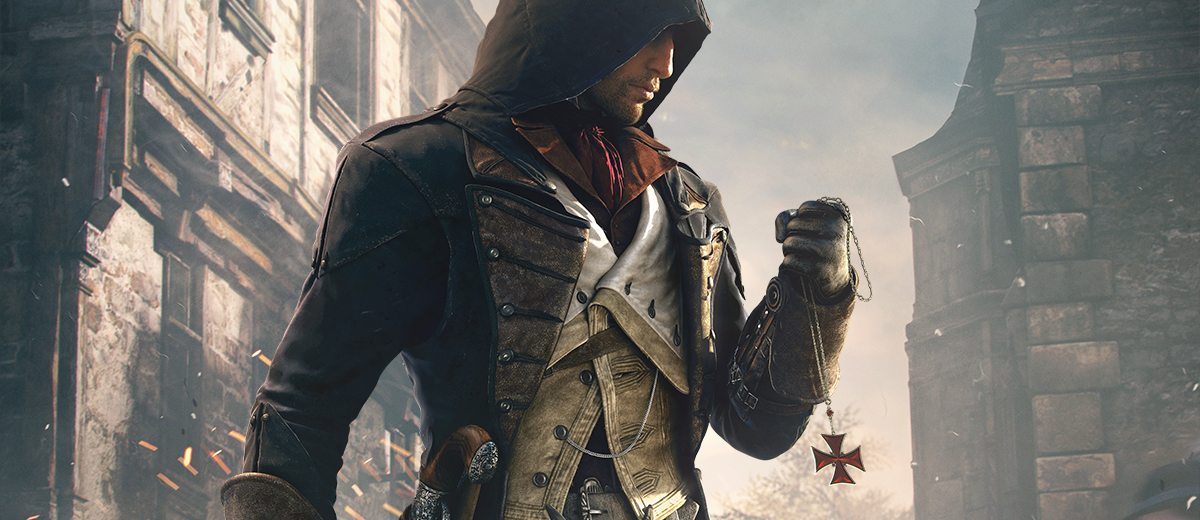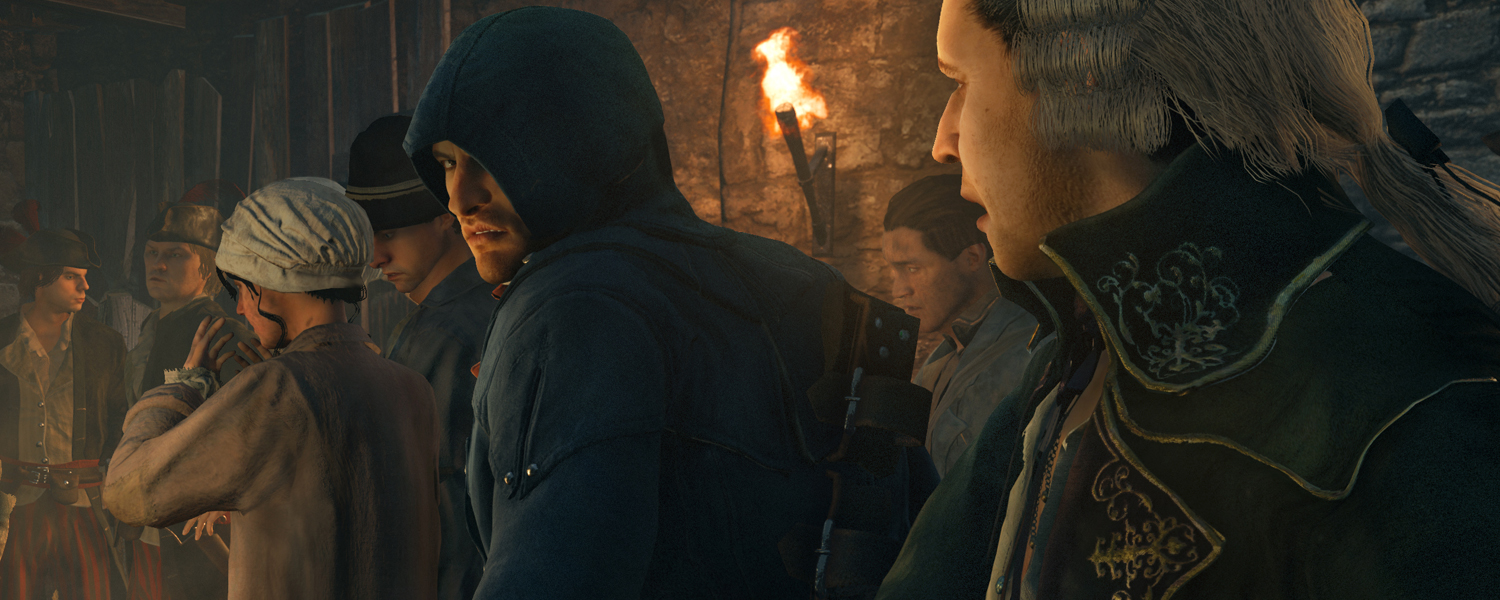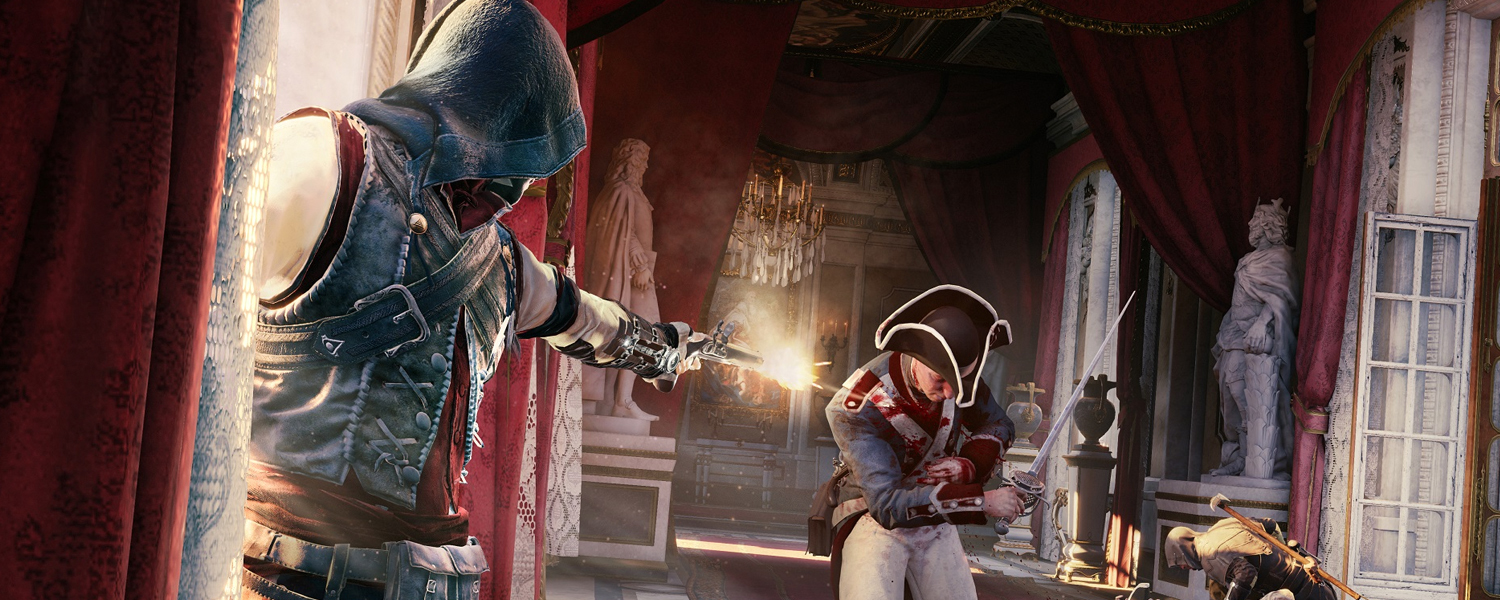The upcoming November craze of releases is upon us, and like every year Ubisoft’s Assassin’s Creed franchise is present, with not one but two titles. In this article we’ll be focussing on it’s flagship release: Assassin’s Creed Unity, and reflect on our expectations for both this title and the franchise’s future.
 The Assassin’s Creed franchise has become a permanent inhabitant of the October/November release rush every year, and since its debut in 2007 the series has become an event that is marked on the calender of many gamers around the world. Whilst the series has had its ups and downs since 2007, the main core mechanics of the franchise have always provided fans with thrilling adventures of a high production value.
The Assassin’s Creed franchise has become a permanent inhabitant of the October/November release rush every year, and since its debut in 2007 the series has become an event that is marked on the calender of many gamers around the world. Whilst the series has had its ups and downs since 2007, the main core mechanics of the franchise have always provided fans with thrilling adventures of a high production value.
But every core needs to be changed up once in a while, and Unity seemingly is doing exactly this, whilst refining mechanics that have been problematic or non-existent in past instalments. What exactly will the game bring us that previous instalments haven’t? To answer those questions, we first have to look back at what came before.
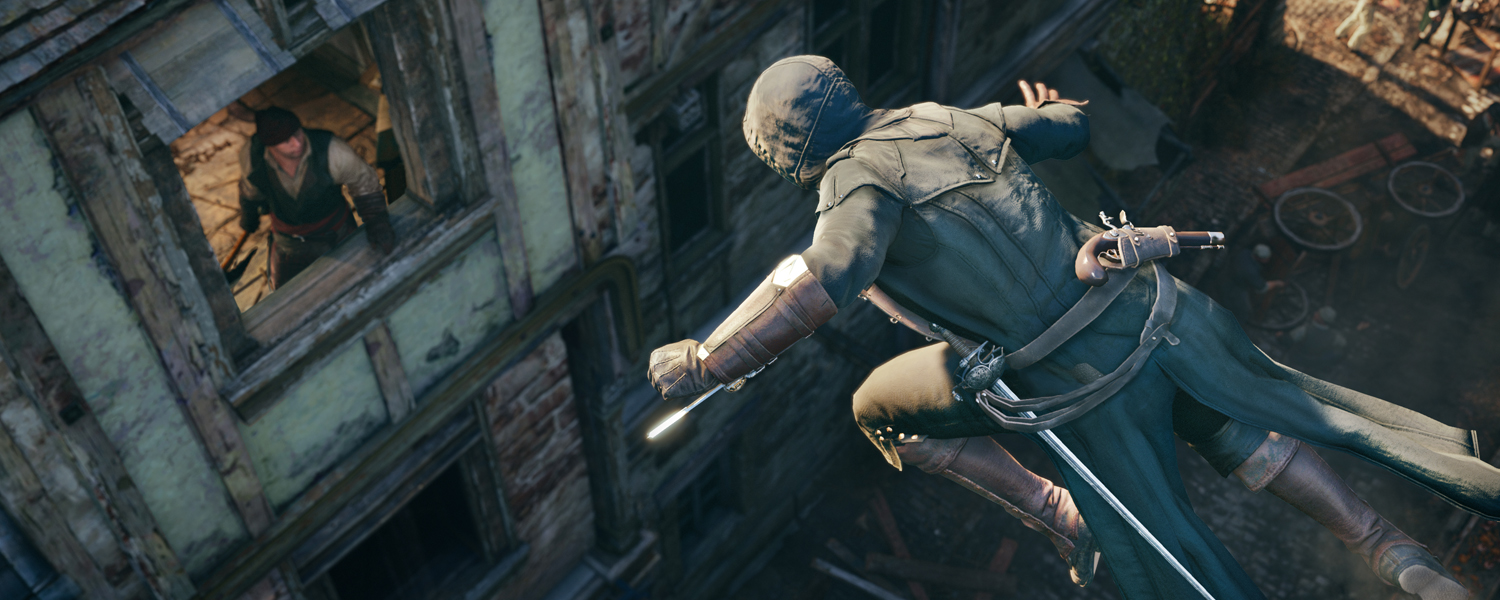 The franchise started out a little bit rough around the edges, and whilst the first game was praised in many ways, the repetitiveness and technological issues brought the game down a few steps from what it initially aspired to be. Its narrative also left things to be desired, as Altair’s first appearance in the franchise wasn’t quite as memorable as his successors. Assassin’s Creed II fixed many of these problems, and with a noteworthy plot and characters, along with technological and gameplay improvements the franchise finally showed the public what the brand was all about.
The franchise started out a little bit rough around the edges, and whilst the first game was praised in many ways, the repetitiveness and technological issues brought the game down a few steps from what it initially aspired to be. Its narrative also left things to be desired, as Altair’s first appearance in the franchise wasn’t quite as memorable as his successors. Assassin’s Creed II fixed many of these problems, and with a noteworthy plot and characters, along with technological and gameplay improvements the franchise finally showed the public what the brand was all about.
With Ezio becoming one of the more popular characters in gaming Ubisoft decided to step up and continue the renaissance-inspired story arc of the franchise, which led to two non-numbered titles: Assassin’s Creed Brotherhood and Assassin’s Creed Revelations. Both titles introduced many new gameplay elements to the franchise, but the most important addition was multiplayer, which would stick around to Assassin’s Creed: Black Flag. Whilst both games had their fair share of faults both narratively and technically they were still pretty solid AAA-titles, and even though there are some rocky elements in the plots of these spin-offs, it was nice to see a well-crafted story arc for what is without a doubt the franchise’s best-written character.
What comes next would be a black mark on the franchise for many, and is easily the most problematically title in the franchise development-wise. Assassin’s Creed III was introduced as the most innovative title in the franchise to date, and would be the first game in the franchise to use the newly updated Anvil NEXT engine, which showed many improvements in gameplay and traversal. Post-release many players ridiculed the title with a lacklustre storyline and a disappointing ending to events that were set up in the previous titles. Assassin’s Creed III’s problems weren’t really because of the quality of the game, but more that its setup is seemingly disappointing at its core. With a drawn-out narrative that features one of the longest prologues in the franchise and gameplay elements that were promised to be revamped that were still seemingly identical to its predecessors. The title did have redeeming factors, and its Wolfpack and naval combat scenarios would be great additions to the franchise.
Assassin’s Creed IV: Black Flag was seemingly a turning point for many players, and took a different approach from different titles when it came to gameplay. Combat, traversal and such were still seemingly identical to the previous titles, but a large part of the game is spent practicing naval combat and traversal, which would provide the franchise with some much-needed variation that was praised by many gamers and press-members alike. Its narrative took quite a different direction when it came to the protagonist and his motivations, creating a mix of the Assassin’s Creed and Pirates of the Caribbean styles of narratives. Arguably Black Flag is the most diverse title in the franchise so far, and whilst many players longed for a more traditional AC experience the game provided a much needed breather from the traditional formula.
But has the franchise ever come close to perfecting it’s formula? Assassin’s Creed Unity may seem more down to earth like the second instalment, but this might make for a better and more grounded experience that may live up to the expectations that were set for the franchise before its debut in 2007. But how close does Unity come to creating the perfect Assassin’s Creed experience? This might be a tough question to answer.
 Unity starts off by introducing a new setting, with the French revolution taking main stage in what could be quite a dark instalment in the franchise is handled correctly. In order to provide players who don’t have a lot of knowledge of this era I’ll provide some context:
Unity starts off by introducing a new setting, with the French revolution taking main stage in what could be quite a dark instalment in the franchise is handled correctly. In order to provide players who don’t have a lot of knowledge of this era I’ll provide some context:
The French Revolution was a revolution in France that lasted from 1789 to 1799. Before 1789, France was ruled by the church and the nobles. Citizens were inspired by the Enlightenment (a cultural movement throughout Europe) to take back some of the power that was held by the king. The American Revolution played a large role in this, as the French saw these events created a country where the people held the power, rather than a king.
The revolution ended in November 1977 when Napoleon Bonaparte took power and initiated his dictatorship over France. The former King; Louis XVI was executed as a result of the revolution.
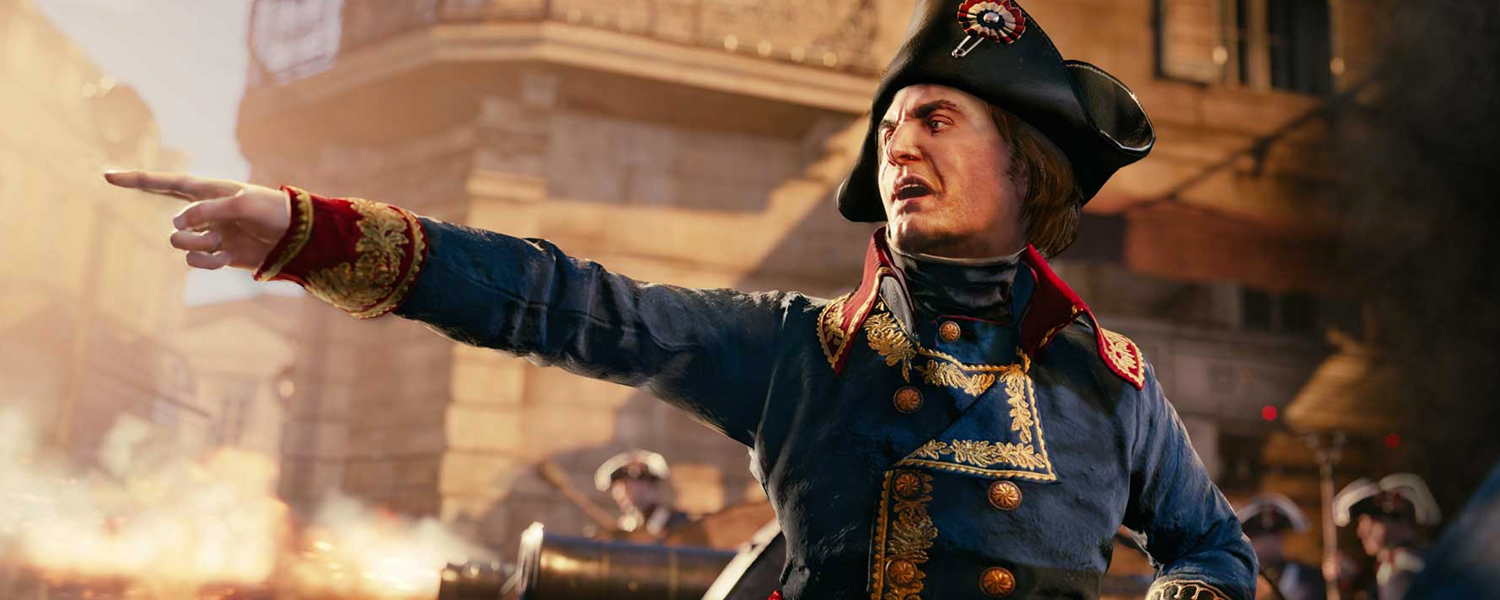 In preview for the games many of the developers have stated that Unity is truly the darkest story they’ve brought us so far, and the setting of this title alone could bring us some of the most intense moments in the franchise if handled correctly. The French Revolution was a dark time, and walking along the citizens of France revolting and experiencing mass-beheadings show us that whilst Unity wants to tell its own story, it’s still seemingly faithful to the core that makes this era so fascinating.
In preview for the games many of the developers have stated that Unity is truly the darkest story they’ve brought us so far, and the setting of this title alone could bring us some of the most intense moments in the franchise if handled correctly. The French Revolution was a dark time, and walking along the citizens of France revolting and experiencing mass-beheadings show us that whilst Unity wants to tell its own story, it’s still seemingly faithful to the core that makes this era so fascinating.
Out of all the games in the franchise Unity seems to be the most involved with the events of its host era, and the connections to the character such as Napoleon could add a new amount of depth to the narrative. Earlier games already did this to a certain extent with characters such as George Washington, Leonardo Da Vinci and such, but the duality of Bonaparte’s character could add some serious conflict depending on Arno’s connection to the character throughout the story.
The real question is how involved Arno will be with the main events of the revolution, but looking at the released gameplay video and trailers the games does seem to give an immersive look into the dynamics of the situations at the time. Given the circumstances there is the possibility that we’ll be given some morally-questionable scenarios throughout the way, but it’s unclear wether Ubisoft will choose to give in to these concepts or stick with the “good guy” scenario in order to keep it safe throughout the narrative. Whilst Ubisoft has treaded through some new waters for the narratives of the games there are some questions concerning how far they are truly willing to go. Assassin’s Creed Rogue might be the franchise’s furthest descent down the karmic ladder when it comes to questionable character actions and/or motivations, and I do have hopes that Unity may cover some new ground when it comes to the dynamics of the narrative.
The relationship between Arno and Elise may also deliver a nice dynamic to the narrative, and without going into spoilers for the story itself I can say that the history between the characters is surely interesting concerning both their positions in the plot itself.
By far one of the biggest changes is the addition of cooperative gameplay. Whilst Assassin’s Creed III and Black Flag offered the Wolfpack game mode, the franchise has never before offered players the opportunity to work together to gain actual rewards, rather than just XP. Players will work together to achieve tasks such as stealing loot from a fortified location or killing specific targets in an area, all whilst acting as stealthy as possible. Whilst the missions can be performed alone (as confirmed by Ubisoft), you’ll most likely want to take three of your friends and work together to get the job done.
There’s currently no word wether Unity’s co-op missions include matchmaking, but order to approach the missions as silently as possible you’ll need to communicate with your co-players, but it’s questionable wether the majority of players will take this approach when going through the missions when playing with random players. If you’ve got your own crew set up for the game you’ll without a doubt have a good advantage, as the easiest way to get through missions is by playing as a synchronised team, which without a doubt will be much easier with some preparation with your friends.
All this talk about synchronised gameplay is not without reason, as it can be quite frustrating when one of your team members compromises the mission. Whilst you’re free to choose your own way to handle the missions, getting alerted by a team member messing up could still cause for some aggravation among players. An example of this is Splinter Cell’s co-op mode, where communication is key because of strategy. Unity’s missions are seemingly less complicated, but the same elements can probably be applied to both titles.
Whilst the lack of traditional multiplayer is unfortunate, it’s still nice to finally see a true co-op experience in the AC universe. Next to Black Flag’s naval warfare this might be the biggest new feature in the franchise so far, and it shows that Ubisoft is finally ready to let Assassin’s Creed mature a bit more when it comes to its features. The question is however: will traditional multiplayer return in the future of the franchise? Or might co-op be the trade off that will either see titles alternating between modes? These questions may be relevant due to the fact that Assassin’s Creed is an annual franchise, and the developing teams may have different visions on what features should return.
 The thing with Assassin’s Creed is that every installment can have a heavy influence on the subsequent instalments, and as of now Unity is seemingly the biggest evolution of the franchise since Assassin’s Creed II. The game might be more back to basics than Black Flag for example, but it’s looking to be perfecting the formula that the franchise has been trying to nail for years. Whilst the Assassin’s Creed franchise has consisted of (mostly) great titles, there’s always been the feeling that it never truly worked up to its potential. Our judgement of the title will be here in a few weeks, and we can’t wait to see what the first true next-generation Assassin’s Creed title has in store for us!
The thing with Assassin’s Creed is that every installment can have a heavy influence on the subsequent instalments, and as of now Unity is seemingly the biggest evolution of the franchise since Assassin’s Creed II. The game might be more back to basics than Black Flag for example, but it’s looking to be perfecting the formula that the franchise has been trying to nail for years. Whilst the Assassin’s Creed franchise has consisted of (mostly) great titles, there’s always been the feeling that it never truly worked up to its potential. Our judgement of the title will be here in a few weeks, and we can’t wait to see what the first true next-generation Assassin’s Creed title has in store for us!
Assassin’s Creed Unity will hit stores on November 13th for PC, PlayStation 4 and Xbox One both digitally and physically.


